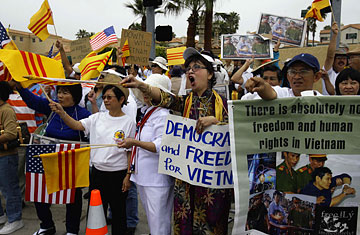
Vietnamese-American protesters demonstrate outside Vietnamese President Nguyen Minh Triet's hotel in Dana Point, Calif., during his visit to the U.S., June 23, 2007
Vietnamese security agents had been tracking their quarry for days, and when police made their move on Nov. 17, they took no chances. At least 20 officers surrounded a house in Ho Chi Minh City and swarmed inside, arresting six people and confiscating documents connected to planned "democracy seminars", witnesses told a pro-democracy group. Such raids are far from unusual: This year at least a dozen Vietnamese activists have been arrested, most charged with "propaganda against the Socialist Republic," a crime punishable by up to 20 years in prison.
But what made the weekend roundup different is that this time the targets were "hostile foreign elements", as the Vietnamese government describes overseas activists — including two U.S. citizens, a Frenchwoman and a Thai national. As of Tuesday, there was no official word on what crime they are accused of; Vietnamese authorities refused to discuss the arrests.
All four of those detained are members of Viet Tan (Vietnam Reform), an organization of overseas Vietnamese working for political change in the motherland. According to the group, the banned materials the activists were distributing included a booklet called "From Dictatorship to Democracy," a summary of peaceful democratic movements from Eastern Europe to Indonesia and the Philippines. "This was simply a peaceful expression of these people's beliefs," says Duy Hoang, the group's Washington, D.C.-based spokesman.
Viet Tan identified its arrested members as Nguyen Quoc Quan, 54, of California and Leon Truong, 54, of Hawaii, both U.S. citizens born in Vietnam. French-Vietnamese writer and activist Nguyen Thi Thanh Van, 51, and ethnic-Vietnamese Thai national Khunmi Somsak, 58, were also arrested. The activists' respective embassies said they are now trying to find out what law they are accused of breaking.
The latest arrests say a lot about Vietnam's intolerance for dissent, but the circumstances of the raid — the democracy seminars — also illustrate new strategies that Vietnamese groups overseas are adopting to challenge the ruling Communist Party. For a long time, in Little Saigons around the world, anti-communist groups tended to be dominated by former officers of the South Vietnamese regime, pushing to create a government in exile, and had little contact with the people in Vietnam itself. Some groups continued to advocate violence: As late as 2001, members of the California-based Government of Free Vietnam were convicted of plotting the attempted bombings of Vietnamese embassies in Bangkok and Manila.
But in recent years, a younger generation of Western-raised Vietnamese has taken a different approach. These new activists — characterized by 35-year-old Hoang, a former investment banker who left Saigon in a boat with his family at age 12 — have been leading a p.r.-savvy campaign for Vietnam's hearts and minds, ditching anti-communist rhetoric in favor of pro-democracy advocacy and strenuously denouncing violence in favor of peaceful grassroots movements. Viet Tan, founded in 1982, uses mass emails to recruit new members inside Vietnam (it won't say how many) and coordinate them with dissident groups. It raises funds to funnel to sympathizers who hold democracy seminars inside the country. Members seek to convert Vietnamese studying in overseas universities to the cause. "This is not your father's overseas Vietnamese political group," says Hoang.
Regardless, the new-style pro-democracy groups have had difficulty making even the smallest political change inside Vietnam. Association with any overseas group — Hanoi still classifies most as terrorist organizations — is grounds for arrest; several of the Vietnamese activists put on trial this year had their links to overseas groups like Viet Tan used as evidence against them. "They are on the right side, advocating non-violent political change, but are they doing good?" asks Carl Thayer, a veteran Vietnam analyst who lectures at Australia's National Defence University. "Any action like that provokes repression. The key leaders of the pro-democracy movement in Vietnam have been systematically rounded up. So they just aren't getting any traction." It's not clear whether the latest arrests will help bring attention to their cause, either. So far, reaction from the U.S. embassy and other foreign missions has been muted, with officials saying they are still seeking more information. Still, the targeting of foreign nationals, apparently for the crime of promoting democracy, is not likely to win Vietnam many hearts and minds abroad.
